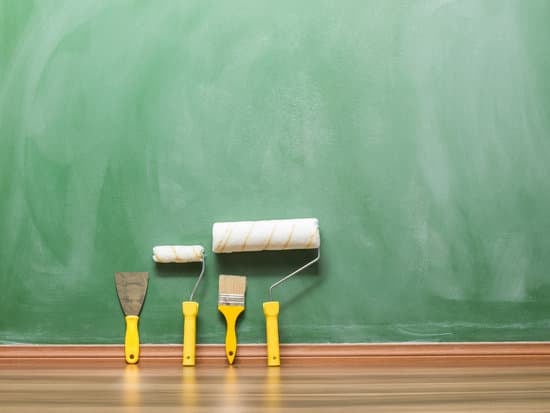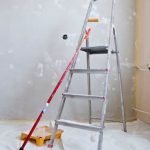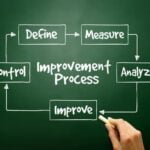As economic recessions loom, homeowner concerns turn towards safeguarding their investments. In this article, we will explore the major home improvements that you should consider before an economic recession hits. By understanding the importance of these improvements, homeowners can protect and even enhance the value of their properties amidst uncertain times.
During economic recessions, home values often take a hit due to reduced demand and increased financial strain on potential buyers. Therefore, it becomes crucial for homeowners to prioritize upgrades that not only improve their living spaces but also have a positive impact on property values. By addressing structural integrity, energy efficiency, functionality, and curb appeal, homeowners can position themselves for success in navigating economic downturns.
This article aims to provide insights into the key indicators and forecasts of the current economic climate to help homeowners evaluate any potential risks or opportunities. Furthermore, we will delve into the dynamics of the real estate market during economic recessions and how they affect home values. Armed with this knowledge, homeowners can make informed decisions about which home improvements are essential for weathering an economic storm and thriving in the long run.
Evaluating the Current Economic Climate
The current economic climate plays a significant role in determining which home improvement projects are the most crucial to undertake before an economic recession. To make informed decisions about where to invest your time and money, it’s essential to evaluate key indicators and forecasts that provide insights into the state of the economy.
One important indicator to consider is the housing market. Look for trends in home prices, inventory levels, and days on the market.
If homes are selling quickly and prices are rising steadily, it may be a good time to invest in major home improvements. On the other hand, if prices are stagnating or declining and homes are sitting on the market for extended periods, it may be wise to focus on more budget-friendly improvements or hold off on major renovations until there is stability in the market.
Another key indicator is consumer confidence. During times of economic uncertainty, consumers tend to cut back on spending and prioritize essentials over discretionary purchases. Monitoring consumer sentiment can provide insights into whether homeowners are likely to engage in large-scale home improvement projects or scale back their plans. Additionally, examining unemployment rates and job growth can help determine how secure people feel in their financial situations.
Industry forecasts should also be taken into account. Consulting experts such as economists, real estate professionals, and construction industry analysts can provide valuable insights into how an upcoming economic recession might impact various aspects of the housing market and home values. These forecasts can help inform decisions regarding which home improvements will have the greatest potential for adding value or enhancing functionality.
In summary, evaluating key indicators such as housing market trends, consumer confidence, and industry forecasts can provide essential information when deciding which major home improvements to prioritize before an economic recession. By understanding the current economic climate, homeowners can make informed decisions that maximize their investment in their homes while preparing for potential challenges ahead.
Navigating the Impact of Economic Recession on Home Values
The impact of an economic recession on home values can be significant, making it crucial for homeowners to understand the dynamics of the real estate market during these times. With the uncertainty that comes with a recession, it is essential to navigate this impact wisely and make informed decisions about home improvements. By understanding how economic downturns affect home values, homeowners can better strategize their efforts to protect and potentially increase their property’s worth.
During an economic recession, the real estate market typically experiences a decline in demand and a decrease in home prices. This is largely due to factors such as job losses, financial instability, and decreased consumer spending. As a result, homeowners may see a decrease in their property’s value as well.
However, it is important to note that not all areas are affected equally during a recession. Certain regions or neighborhoods may experience a more severe decline in home values compared to others.
To navigate the impact of an economic recession on home values, homeowners should closely monitor the local real estate market and its trends. This includes understanding key indicators such as inventory levels, days on market, and average sales prices in their area. Additionally, keeping an eye on forecasts from reputable sources can provide valuable insights into future market conditions.
| Key Indicators | Data |
|---|---|
| Inventory Levels | Number of homes available for sale |
| Days on Market | Average number of days properties remain on the market before being sold |
| Average Sales Prices | The median or mean price at which homes are sold |
By staying informed about the local real estate market dynamics and trends, homeowners can make informed decisions about their home improvements. For example, if there is an oversupply of homes in the market and prices are declining, focusing on essential repairs and maintenance to maintain the property’s value may be more crucial than investing in major renovations.
On the other hand, if the market shows signs of stability or growth despite the recession, strategically improving certain aspects of your home could potentially increase its value.
Navigating the impact of economic recession on home values requires careful consideration and planning. Homeowners should consult with real estate professionals, such as real estate agents or appraisers, who have expertise in understanding market dynamics. These professionals can provide valuable insights and guidance on which home improvements are likely to have a positive impact on a property’s value during an economic downturn.
Strengthening Your Home’s Foundation
One of the most important home improvements to consider before an economic recession is strengthening your home’s foundation. The foundation is the structural component that supports the entire house, and ensuring its integrity is crucial for long-term stability. By investing in this improvement, homeowners can protect their property and potentially avoid costly repairs in the future.
To strengthen your home’s foundation, there are several steps you can take:
- Conduct a professional inspection: Start by hiring a qualified engineer or foundation specialist to evaluate the condition of your foundation. They will assess any existing cracks, signs of settlement, or other issues that need attention.
- Repair any problems: If the inspection reveals any problems with your foundation, it is essential to address them promptly. This may involve repairing cracks, reinforcing weak areas, or even installing additional support systems such as steel piers or helical piers.
- Improve drainage around the foundation: Poor drainage can lead to water accumulation around the foundation, causing soil erosion and compromising its stability. Take steps to ensure proper grading away from the house and consider installing gutters and downspouts to redirect water away from the foundation.
- Maintain a stable moisture level: Moisture fluctuations in the soil can cause it to expand and contract, putting stress on the foundation. To maintain a stable moisture level, consider using soaker hoses or installing a sprinkler system with a timer to irrigate your landscaping evenly.
By taking these steps to strengthen your home’s foundation, you not only ensure its structural integrity but also potentially increase its value when faced with an economic recession. A strong foundation provides peace of mind for homeowners and may attract potential buyers who prioritize stability and durability in their investment.
Overall, prioritizing this key home improvement project before an economic recession is a wise decision that can have long-lasting benefits for homeownership.
Improving Energy Efficiency
Improving energy efficiency is a crucial step in preparing your home for an economic recession. Not only does it help lower monthly bills, but it can also significantly increase the value of your home. In this section, we will explore various ways to improve energy efficiency and highlight how these improvements can benefit homeowners during challenging economic times.
The Importance of Energy Efficiency
Energy-efficient homes have become increasingly popular in recent years due to rising energy costs and environmental concerns. By investing in energy-efficient upgrades, homeowners can reduce their carbon footprint, conserve natural resources, and save money on utility bills.
During an economic recession, when finances may be tight, lowering monthly bills can provide a much-needed financial relief. With reduced expenses on energy consumption, homeowners have more disposable income for other essential expenses or savings.
Key Energy-Efficient Upgrades
There are several effective ways to improve energy efficiency in your home. Consider upgrading to:
- Energy-Efficient Appliances: Replace outdated appliances with Energy Star certified models that consume less electricity or water while maintaining performance.
- Smart Thermostats: Install programmable thermostats that allow you to regulate heating and cooling settings based on your schedule. This helps optimize energy usage and reduces waste.
- Insulation Upgrades: Improve insulation in walls, attic spaces, basements, and crawlspaces to prevent heat loss or gain, reducing reliance on heating and cooling systems.
- Efficient Lighting: Switch to LED light bulbs that are more energy-efficient and have a longer lifespan compared to traditional incandescent bulbs.
- Solar Panels: Consider installing solar panels on your roof to generate renewable energy and potentially offset a significant portion of your electricity costs over time.
By implementing these upgrades, you not only save money but also increase the value of your home. As more buyers recognize the importance of sustainability and lower utility bills, an energy-efficient home becomes a desirable asset in the real estate market.
Upgrading Kitchen and Bathroom
When it comes to home improvements that are worth investing in before an economic recession, upgrading the kitchen and bathroom is often at the top of the list. These are two areas that potential buyers prioritize when searching for a new home, making them key selling points and valuable assets during uncertain times.
In terms of functionality, updating your kitchen and bathroom can greatly improve your daily life. Outdated appliances, limited storage space, and inefficient layouts can make these spaces frustrating to use on a regular basis. Upgrading to modern, energy-efficient appliances can not only make cooking and cleaning easier but also save you money on utility bills in the long run.
Additionally, enhancing the appeal of your kitchen and bathroom can significantly increase your home’s value. Aesthetically pleasing features such as new countertops, updated fixtures, and stylish tile or backsplash can make a big impact on potential buyers. Creating a visually appealing space can help your home stand out in a competitive market and attract more potential buyers when you decide to sell.
| Home Improvement | Cost | Return on Investment |
|---|---|---|
| Kitchen Remodel | $25,000 – $50,000 | 70% – 80% |
| Bathroom Remodel | $10,000 – $20,000 | 60% – 70% |
As you can see from these numbers, investing in kitchen and bathroom upgrades can provide a significant return on investment. However, it’s important to keep in mind that the specific costs and returns will vary depending on factors such as location, size of the space, and quality of materials. Consulting with a professional contractor or real estate agent can help you create a more accurate budget and plan for your specific home.
Overall, upgrading your kitchen and bathroom is not only beneficial for your own enjoyment but also a smart financial decision in preparation for an economic recession. By enhancing functionality and appeal, you can make your home more attractive to potential buyers and increase its value in a competitive market.
Investing in Outdoor Spaces
Investing in outdoor spaces can not only create a beautiful oasis for relaxation and entertainment but also increase the overall value of your home. During times of economic recession, when people tend to spend more time at home, having an inviting outdoor space becomes even more essential.
One way to start investing in outdoor spaces is by creating a functional seating area. This could include adding comfortable patio furniture, installing an outdoor fireplace or fire pit, and even building a pergola or gazebo to provide shade and protection from the elements. Adding these features can transform your outdoor space into a cozy retreat where you can entertain guests or simply relax with your family.
In addition to creating a seating area, landscaping is another crucial aspect of enhancing your outdoor space. Consider planting flowers, shrubs, and trees that are low-maintenance but offer beauty throughout the year. Incorporating native plants can be especially beneficial as they typically require less water and upkeep. You may also want to consider adding pathways or walkways to connect different areas of your outdoor space, making it more accessible and visually appealing.
To make your outdoor space truly stand out, consider incorporating elements that cater to specific interests or hobbies. For example, if you enjoy cooking and entertaining outdoors, you could invest in an outdoor kitchen complete with a grill, countertop space, and storage for utensils and supplies.
If you’re an avid gardener, consider creating raised beds or allocating space for a vegetable garden. These personal touches not only enhance the functionality of your outdoor space but also add unique character to your home.
Investing in outdoor spaces not only provides opportunities for relaxation and entertainment but can also significantly increase the overall value of your home. By creating an inviting oasis that reflects your personal preferences and interests, you can create a space that is both enjoyable for yourself and attractive to potential buyers should you decide to sell in the future.
- Create a functional seating area with comfortable patio furniture
- Install an outdoor fireplace or fire pit
- Build a pergola or gazebo for shade and protection from the elements
- Landscaping with low-maintenance plants, flowers, shrubs, and trees
- Incorporate pathways or walkways to connect different areas of your outdoor space
- Add elements that cater to specific interests or hobbies such as an outdoor kitchen or vegetable garden
Maximizing Storage
Maximizing storage is an important aspect of home improvement, especially in times of economic recession. With limited financial resources, homeowners can make strategic decisions to increase space and declutter their homes, creating a more efficient living environment. This section will discuss the benefits of maximizing storage, provide practical tips for increasing space, and explore decluttering strategies.
The Benefits of Maximizing Storage
Maximizing storage not only helps homeowners live in a more organized and efficient manner but also has significant long-term advantages. By increasing storage space, homeowners can reduce clutter and create a more visually appealing living environment. This can lead to reduced stress levels and improved mental well-being.
Additionally, maximizing storage can help maximize the home’s value. Potential buyers often seek properties with ample storage as it provides practicality and convenience. The increased functionality offered by effective storage solutions can make your home more marketable in times when the real estate market may be experiencing downturns due to economic recessions.
Tips for Increasing Space
There are various strategies that homeowners can implement to increase storage space without breaking the bank:
- Utilize Vertical Storage: Make use of vertical wall space by installing shelves or hanging organizers. This allows you to free up valuable floor space while keeping items within easy reach.
- Optimize Existing Space: Explore underutilized areas such as under the stairs, beneath furniture pieces, or inside closet doors. These spaces can be transformed into additional storage areas through the use of hooks, cubbies, or hanging organizers.
- Invest in Multi-functional Furniture: Look for furniture pieces that offer hidden storage compartments such as ottomans with built-in drawers or beds with underneath storage.
Decluttering Strategies
Decluttering is an essential step in maximizing storage and creating an efficient living environment:
- Sort and Purge: Begin by sorting items into categories such as keep, donate, or sell. Dispose of any items that are no longer needed or used regularly.
- Organize and Label: Ensure that all remaining items have designated spaces and are properly organized. This makes it easier to find what you need when you need it.
- Assess Storage Solutions: Evaluate your current storage solutions and invest in additional ones if necessary. Consider using clear containers, baskets, or bins to keep similar items together and easily accessible.
By implementing these tips and strategies for maximizing storage and decluttering, homeowners can create a more efficient living space that is better suited to withstand the challenges of an economic recession. Not only will this improve the functionality of their homes but also potentially increase their value in a competitive real estate market.
Reducing Maintenance Costs
Maintaining a home can be a significant expense, especially during times of economic recession. As homeowners face financial uncertainties, it becomes essential to implement low-maintenance features that can help reduce ongoing maintenance costs. By investing in these features now, you can ensure the longevity of your home while minimizing the need for frequent repairs and renovations.
Durable and Long-Lasting Materials
One way to reduce maintenance costs is by opting for durable and long-lasting materials when making improvements to your home. For example, consider using metal roofing instead of traditional asphalt shingles, as metal roofs typically have a longer lifespan and require less maintenance. Similarly, selecting vinyl or composite materials for siding can minimize the need for repainting or regular upkeep.
Low-Maintenance Landscaping
Landscaping can add beauty to your home but also comes with its share of maintenance requirements. To reduce these costs, opt for low-maintenance landscaping options such as native plants that are accustomed to the local climate conditions and require minimal watering and care. Additionally, consider installing an irrigation system with programmable timers to efficiently water your plants without wasting excess water.
Easy-to-Clean Surfaces
Choosing easy-to-clean surfaces throughout your home can save time and money on maintenance in the long run. For instance, selecting stain-resistant flooring materials like porcelain tiles or luxury vinyl planks can greatly reduce the effort required to keep them looking clean and new. Similarly, installing countertops made of quartz or other non-porous materials makes them resistant to stains and easy to wipe clean.
By implementing these low-maintenance features, homeowners can significantly reduce their ongoing expenses in maintaining their homes. Not only will this provide financial relief during economic downturns but it will also contribute to the long-term sustainability and value of the property. As you prepare your home for an economic recession, consider these strategies to minimize maintenance costs and maximize the benefits of homeownership.
Enhancing Curb Appeal
When it comes to preparing your home for an economic recession, one important factor to consider is its curb appeal. Enhancing the exterior of your home not only increases its value but also attracts potential buyers, should you decide to sell in the future. In this section, we will discuss various strategies and improvements that can help you achieve these goals.
One effective way to boost curb appeal is through landscaping. A well-maintained yard with vibrant flowers, neatly trimmed shrubs, and healthy greenery can significantly enhance the overall appearance of your home. Consider hiring a professional landscaper who can provide guidance on the types of plants that thrive in your region and complement the style of your property.
In addition to landscaping, another aspect of curb appeal is the condition of your home’s exterior. Take a walk around your property and identify any repairs or maintenance tasks that need attention. This could include fixing cracks in the driveway or sidewalk, replacing broken or outdated light fixtures, or repainting the front door and shutters. These small improvements can go a long way in making a positive first impression.
A key element of enhancing curb appeal is ensuring that your home’s exterior matches its architectural style. If you have an older home, consider restoring or preserving any original features such as ornate trim work or decorative railings. On the other hand, if you have a modern home, focus on creating clean lines and minimalistic design elements. Cohesion between the architecture and exterior aesthetics will make your home more visually appealing.
To summarize, enhancing curb appeal is an important aspect of preparing for an economic recession. By investing in landscaping, addressing necessary repairs, and maintaining architectural integrity, you can boost the value of your home and attract potential buyers when needed.
| Strategies | Description |
|---|---|
| Landscaping | Hiring a professional landscaper to create an aesthetically pleasing yard with strategically chosen plants. |
| Exterior Repairs and Maintenance | Identifying and fixing any cracks, replacing broken light fixtures, and repainting the front door and shutters. |
| Preserving Architectural Style | Restoring or preserving original features for older homes, or focusing on clean lines and minimalistic design for modern homes. |
Budget-Friendly Home Improvements
In uncertain economic times, it is important to be proactive and take steps to protect your home’s value. One way to do this is by making budget-friendly home improvements that are cost-effective and can help prepare you for an economic recession. By focusing on strategic upgrades that offer a high return on investment, you can ensure your home not only maintains its value but also attracts potential buyers if the need arises.
One of the first areas to consider when it comes to budget-friendly home improvements is energy efficiency. This can be done through simple measures such as upgrading insulation, sealing air leaks, and installing energy-efficient appliances.
Not only will these improvements lower your monthly utility bills, but they also increase the value of your home. In fact, energy-efficient homes often have a higher resale value and are more attractive to potential buyers who are looking for ways to reduce their environmental impact and save money in the long run.
Another cost-effective strategy for preparing for an economic recession is maximizing storage space. Consider implementing creative storage solutions such as built-in shelving, under-bed storage, or utilizing unused spaces like corners or closets effectively. Increasing storage space not only helps declutter your home but also makes it more functional and organized. Potential buyers appreciate well-organized homes with ample storage options, so this improvement can greatly boost the appeal and value of your property.
Lastly, improving curb appeal is another effective way to enhance the value of your home without breaking the bank. Simple tasks like maintaining a well-manicured lawn, pruning shrubs and trees, repainting the front door, or adding some colorful flowers can make a significant difference in how your home is perceived. First impressions matter, so investing in enhancing the exterior appearance of your property can make it more appealing to potential buyers down the line.
Conclusion
In conclusion, it is crucial to prioritize home improvements before an economic recession hits. By understanding the impact of a recession on home values and the current economic climate, homeowners can make informed decisions to protect their investment and create long-term stability.
One key area to focus on is strengthening your home’s foundation. Ensuring structural integrity will not only provide a safer living environment but also increase the value of your property. Investing in professional inspections and repairs can prevent costly issues down the line and give you peace of mind during uncertain times.
Additionally, improving energy efficiency is another smart move. Lowering monthly bills not only helps save money but also adds value to your home. Simple upgrades such as sealing drafts, installing energy-efficient appliances, and enhancing insulation can go a long way in increasing your property’s appeal to potential buyers.
Upgrading your kitchen and bathroom is another worthwhile investment. These areas are known to significantly impact a home’s functionality and appeal. Renovating outdated features, adding modern fixtures, or expanding storage space can greatly enhance your everyday living experience while attracting potential buyers in the future.
Investing in outdoor spaces is also essential for creating an oasis for relaxation and entertainment. Building a deck or patio, landscaping with native plants, or adding outdoor amenities like fire pits or water features can transform your backyard into an attractive retreat that adds value to your property.
Maximizing storage options is another important consideration. Increasing space and decluttering can help create efficient living environments that potential buyers find appealing. Consider utilizing underutilized spaces or investing in built-in storage solutions to optimize every inch of available space.
Furthermore, implementing low-maintenance features not only reduces maintenance costs but also increases longevity. From selecting durable materials for flooring and countertops to installing smart systems that automate tasks like watering plants or adjusting temperature settings, these choices can help streamline maintenance requirements for years to come.
Lastly, enhancing curb appeal should not be overlooked as it can significantly boost home value and attract potential buyers. Simple improvements such as freshening up the exterior paint, adding landscaping elements, or replacing a worn-out front door can make a big difference in creating a positive first impression.
Frequently Asked Questions
Is it better to do home improvements during a recession?
The decision of whether it is better to do home improvements during a recession depends on various factors. Generally, during an economic downturn, homeowners may have more bargaining power and be able to negotiate lower prices with contractors and suppliers due to decreased demand. Additionally, during a recession, interest rates may be lower, making it more affordable to finance home improvements through loans or mortgages.
However, it is important to consider one’s financial stability and job security before undertaking costly projects during a recession. If there are uncertainties about one’s income or financial situation, it may be wiser to prioritize savings over home renovations during this period.
How can we prepare for a recession at home?
There are several ways individuals can prepare for a recession at home. Firstly, building an emergency fund is crucial in order to have a financial cushion in case of unexpected job loss or financial setbacks. It is recommended to aim for at least three to six months’ worth of living expenses saved up.
Cutting back on unnecessary expenses and reducing debt can also help create a stronger financial foundation ahead of a potential downturn. Another essential step is reviewing and adjusting one’s budget to focus on essential expenses while minimizing discretionary spending. Additionally, diversifying sources of income and investing in skills development can provide added resilience when facing economic hardships.
Will renovation costs go down in 2023?
Predicting specific renovation costs for any given year, such as 2023, is challenging due to the numerous factors influencing the construction industry and market trends. While general predictions suggest that renovation costs tend to increase over time due to inflation and increased material/labor costs, it is impossible to accurately determine how costs will change in upcoming years without considering specific circumstances or locations.
Factors like overall economic conditions, fluctuations in supply and demand within the construction sector, changes in government policies related to housing or construction regulations can all impact renovation costs in 2023 and beyond. Therefore, consulting local experts such as contractors or construction professionals could provide more accurate insights into regional cost projections for renovations in 202

I’m thrilled to have you here as a part of the Remodeling Top community. This is where my journey as an architect and remodeling enthusiast intersects with your passion for transforming houses into dream homes.





